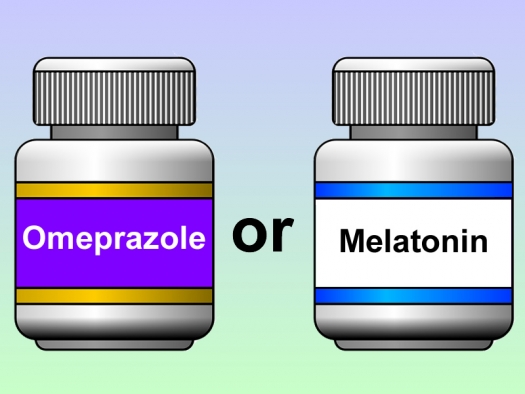OmeprazoleOrMelatonin.jpg

Illustration by FAIM, 2016 / Images from pixabay.com, CC0
If you’re one of the more than 20 million Americans taking a proton-pump inhibitor (PPI) such as Prilosec to treat heartburn, you’re probably experiencing some short-term relief. Now, heartburn is a bit of a misnomer, since the pain you’re feeling is a result of stomach acid entering the esophagus. But unfortunately, it turns out that heartburn drugs may be more appropriately named than their makers intended – a new study conducted at the Stanford University School of Medicine has found that taking these drugs can put your heart at risk in the future.
PPIs are commonly prescribed in part because doctors believe them to be safe. In fact, they are considered so safe that they’re now available over the counter. This new study suggests it may be time to reevaluate those assumptions. Lead study author Nigam Shah has been a pioneer of using data-mining techniques to identify connections between medical phenomena by examining databases of electronic health records. This technique lets him identify associations – though not necessarily causations – between infinite combinations of drugs and patient symptoms.
For this particular study, Shah mined data from the records of 297,000 heartburn patients from two health-record databases. What Shah and his team of researchers found was shocking. Heartburn sufferers who were prescribed PPIs or reported using them had a 16-21% increased risk of heart attack – even if they were young and healthy.
To see if this connection held up elsewhere, Shah examined an ongoing prospective, longitudinal study of patients who have experienced chest pain, shortness of breath, or abnormal stress-test results. Patients participating in this study reported whether or not they use PPIs. If they do, Shah found that their risk of experiencing a heart attack, cardiac arrest, or stroke more than doubles.
In 2013, John Cooke, MD, PhD, published a study in Circulation suggesting the PPIs cause biochemical reactions that lower nitric oxide levels in blood vessel tissues, which could explain why PPIs increase risk even in otherwise-healthy patients. Shah explained that in their study, “We looked at cardiovascular risk for different PPI drugs, and we found that the degree to which the use of any particular PPI was associated with a subsequent heart attack mirrors the degree to which the drug inhibits nitric oxide in the vasculature.”
Shah notes that his study doesn’t conclusively prove a causal link between PPIs and heart attacks, as more research needs to be done to investigate the findings. But he does think doctors should be far more cautious about prescribing these medications – and firmer in instructing patients to stick to the recommended periods of use, as people tend to take them for much longer than they should.
Fortunately, there’s a way you can treat heartburn without putting your heart at risk. And not only will this method relieve your heartburn, it will give you a number of other benefits as well, from improving your sleep to supporting your immune system to preventing cancer. This wonder drug isn’t a drug at all – it’s melatonin! If you’re skeptical, let’s see how it stacks up against the pharmaceuticals.
In a study of 350 people struggling with GERD, doctors gave half of the patients 6 mg of melatonin. They gave the other group the maximum dose, 20 mg, of omeprazole, which is the generic form of Prilosec.
Omeprazole worked nearly two-thirds of the time. In fact, after 40 days, 65.7% of the patients weren’t experiencing symptoms anymore. A few had some side effects: 1% had a persistent headache, 4% had diarrhea, and 1.7% ended up with high blood pressure.
Two-thirds sounds like decent results. Sure, there were some side effects, but that seems to be a risk you take with any drug. So how did melatonin compare? First of all, there were no side effects. But better than that, every single one of the patients was symptom free. That’s right – melatonin had a 100% success rate! The researchers were so impressed that they had the unfortunate third of patients who didn’t experience relief from omeprazole give melatonin a try too. And sure enough, every single one of them recovered.
Did you know that cells in your intestinal tract also make melatonin, and the sun doesn’t affect this production? As you eat, your intestines release melatonin, which helps you avoid ulcers, keeps your stomach from producing too much acid, and wards off infections in your intestines. It also keeps stomach acid from traveling up the esophagus, which causes heartburn. So if your intestines aren’t producing sufficient melatonin, you may begin experiencing these issues. Supplementing with 3-6 mg can help. You may experience some drowsiness, but you certainly won’t increase your risk of heart attacks. So talk to your doctor right away about switching to melatonin.
Originally published in Women's Health Letter, August 1, 2015. Used with permission.


